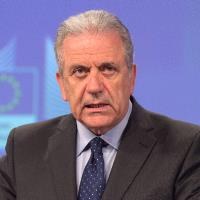(BRUSSELS) – The European Commission urged EU Member States to improve security cooperation on Wednesday, in the wake of the terrorist attacks in Paris and Brussels.
The Commission adopted the European Agenda on Security a year ago, seen as an effective EU response to security threats over the period 2015-2020. While security is a matter for national authorities, the Commission believes these need to be able to cooperate seamlessly if Europe is to prevent terrorism and track down its perpetrators.
Migration, Home Affairs and Citizenship Commissioner Dimitris Avramopoulos said: “The internal security of one Member State is the internal security of all Member States. Fragmentation makes us vulnerable. It is exploited to the full by terrorists and criminals, as the recent attacks in several of our Member States have shown. We need to overcome this and turn our commitments into action to achieve a true EU Security Union.”
The Communication adopted by the Commission today identifies implementation gaps in the fight against terrorism and sets out the actions that need to be taken to address these gaps. It provides a roadmap identifying a number of priority areas in the fight against terrorism where the adoption and implementation of measures proposed by the Commission, and some further action, is needed. These measures, aimed at increasing the collective capacity to tackle the terrorist threat, include:
-
Returning foreign terrorist fighters: the Commission says that national authorities need to be fully informed of movements of foreign terrorist fighters, both outgoing and incoming and to share such information with each other and with EU agencies through the Schengen Information System and Europol’s European Counter Terrorism Centre;
-
Preventing radicalisation: it says priority must be given to the prevention of radicalisation and recruitment of European citizens by terrorist organisations. Member States need to ensure that those already radicalised enter de-radicalisation programmes and are prevented from spreading terrorist propaganda and hate speech and that information on those presenting a high risk of radicalisation is proactively exchanged;
-
Sanctioning terrorists and their backers: the European Parliament and the Council should swiftly reach an agreement on the Commission’s proposal for a Directive on Combatting Terrorism to strengthen the criminalisation of terrorist related offences such as terrorist travel and providing financing, housing, transport or material support to terrorists;
-
Improving information exchange: the European Parliament and the Council should swiftly finalise the revised Europol regulation and adopt the legislative proposals presented by the Commission to improve information exchange and interoperability of databases and information systems, such as the extension of the European Criminal Records Information System (ECRIS) to non-EU citizens;
-
Strengthening the European Counter Terrorism Centre: the European Counter Terrorism Centre should be strengthened to become the law enforcement intelligence hub for threat analysis and to support the development of counter-terrorism operational plans. The Commission will bring forward initiatives to develop the Centre into a stronger structure, with the capacity for joint operational planning, threat assessments and law enforcement intelligence coordination. Joint threat assessments on terrorism and radicalisation should start being developed already now as a matter of urgency.
-
Cutting the access of terrorists to firearms and explosives: Member States should implement as a matter of priority the Action Plan on firearms and explosives and the Parliament and Council should adopt the proposal for the revision of the Directive on the control of the acquisition and possession of weapons presented by the Commission on 18 November 2015;
-
Cutting access of terrorists to funds: the Commission will deliver on the Action Plan on fighting terrorist financing to help Member States strengthen the detection and prevention of movement of funds and other assets and to disrupt the sources of revenue of terrorist organisations;
-
Protecting citizens and critical infrastructures: law enforcement and other key authorities need to be better prepared for security risk related to the vulnerability of critical infrastructure, ensure efficient exchange of relevant information, design preventive measures in a coordinated manner across borders and support research on future technological and capability needs;
-
The external dimension: greater coherence between internal and external actions in the field of security needs to be ensured. Drawing on the work of the EU Counter Terrorism Coordinator, the Commission and the EEAS, the EU should initiate anti-terrorism partnerships with countries around the Mediterranean.
Further information
Commission memo: Implementation of the European Agenda on Security: Questions & Answers


